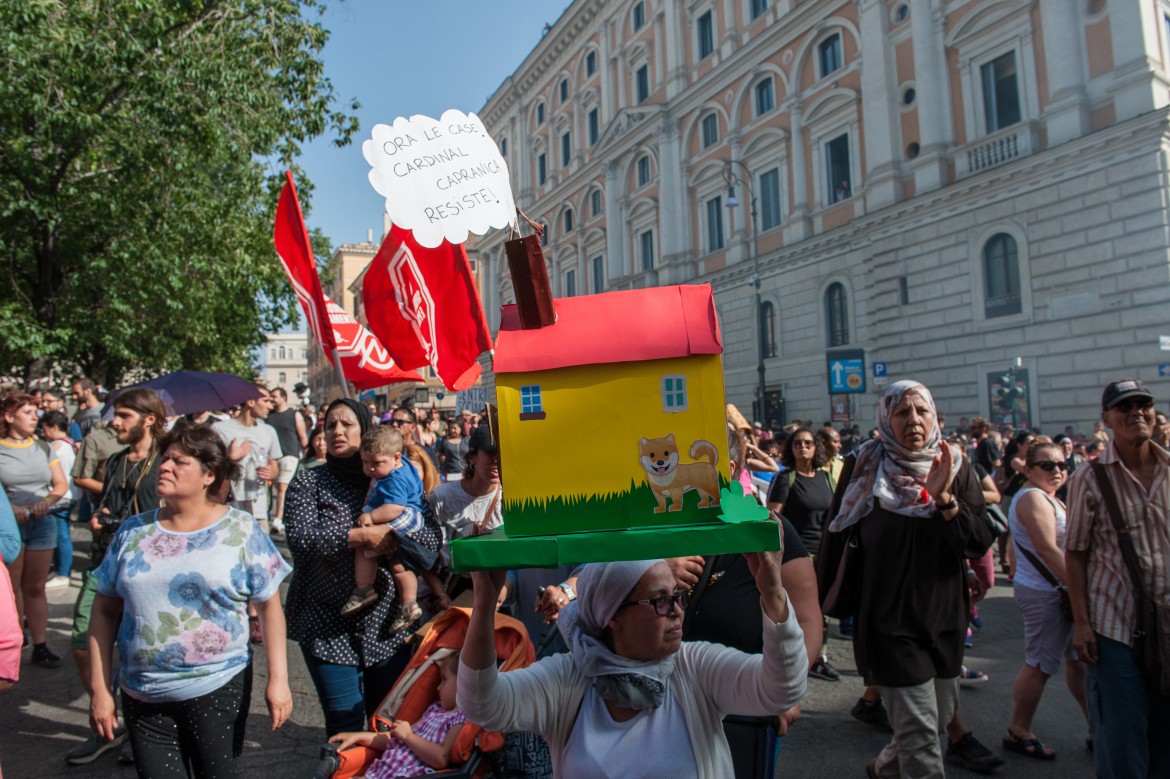Commentary
A wall of humanity against the Salvini doctrine
On Saturday a miracle took place in Rome: the “invisible” became visible, as an enormous demonstration marched across the city in support of public housing. A solution would involve the state making unoccupied public dwellings available, money from the region and coordination from the city of Rome.

In the narrative many are trying to push about what’s happening in Italy, the occupants of abandoned buildings—often publicly owned—are a problem that should be addressed with repression and cutting off their water and electricity supply. These citizens are the lowest of the low. They don’t have political parties to support them. They effectively don’t exist.
Then on Saturday a miracle took place in Rome: the “invisible” became visible, as an enormous demonstration marched across the city. There were the children forced to live in the daily anxiety that comes with their uncertain situation, every day at risk of eviction. There were the legal immigrants who, because of their extremely precarious jobs, can’t meet the basic need of having a place to live. And there was a river of young people supporting them, defending the rights of the occupiers and affirming that they are welcome.
This miracle was accomplished thanks to the occupiers themselves, who are becoming more and more aware of their rights, as well as to the many committees, associations and unions which have done their part in recent years, each in their own way, to bring up the topic of housing and of what the city is supposed to be, and put it at the center of political debate. The miracle could have only taken place thanks to an unprecedented climate of unity in action, which has been built up through many public meetings—for instance, the “Roma non si ferma” (“Rome does not stop”) public event that is still ongoing in Caravaggio Park—and which has made the vision of an inclusive city prevail.
This wall of humanity demanding recognition of their dignity, a home worthy of the name and integration services has laid bare the senseless inhumanity of the Salvinian doctrine. His “security” policies have done nothing but fuel a climate of hatred and have nothing to offer except evictions at any cost.
For over 10 years, the Lazio region has had a total of €180 million available, which could have been used to buy more than 1,000 housing units. This was not done because of the stubbornness of those who refuse to recognize the rights of those who have been forced in recent years to meet their housing needs through occupation. In effect, a policy line of strict legalism has been imposed, trying to foment war among the poor—namely, between those allowed on the lists for public housing, the occupiers and those housed in “residences,” whose condition is a blemish on society. Just to keep these people alive, the City of Rome spends €25 million on rents every year. With this approach, €500 million have been senselessly wasted over 20 years. This is how the housing crisis is being used to fuel the climate of fear and to award enormous incomes to a few real estate speculators.
There is only one way to dispel this intolerable paralysis: setting up a special program to solve the housing crisis with open minds. This program would have to involve the collaboration of the state institutions, the municipality of Rome and the Lazio region. The state must offer the abandoned publicly owned buildings and the economic resources that are missing. The municipality must plan the operations.
In the 1980s, the last left-wing administration of the city built the last of the public housing neighborhoods, Tor Bella Monaca, over three years, where 5,000 families who were living in improvised dwellings finally found a home. Now, it’s impossible to house so many families in a precarious condition close together, and it is necessary to find many different places to solve the emergency.
The march Saturday tells us, however, that not even this road would be sufficient all by itself. The extraordinary program that would solve this crisis must also involve those who have taken it upon themselves to do what the state institutions have refused to: the local committees, the third sector, the trade unions and the social organizations, both secular and Catholic, which have managed to keep alive the idea of a united city. We need more than just houses: we need social redemption. What is needed is to build an inclusive city, something that would overpower the degradation that is slowly stifling Rome.
Originally published at https://ilmanifesto.it/un-muro-di-umanita-contro-le-ricette-salviniane/ on 2019-06-23
